For $62.30 USD, $69.99 USD, or $78.94 USD, you can buy the Fenix Airbus 320, PMDG 737, and Leonardo MD-80, respectively. These three payware jetliners recently released within weeks of each other for Microsoft Flight Simulator. This is the very same simulator some folks can initially play for just a mere dollar due to it being a part of the Xbox Game Pass service; a promotion that Microsoft seems to have qualms about continuing to issue to newcomers. Even in the case of fully subscribing Xbox Game Pass Ultimate, that’s only $14.99 USD spent per month to play Microsoft Flight Simulator, among other games. Those who do choose to buy the sim outright need only spend $59.99 USD.
The point here is that no matter how one accesses Microsoft Flight Simulator, the core sim itself is still notably cheaper than some of these aforementioned new add-ons. Unlike full games, these add-ons only tend to go down in price after spending quite a while on the market. In other words, within the next three or five years, if not more, those prices may not change much. And yet, simmers everywhere have been clamoring over these new aircraft for the past few weeks.
Much ado…
Notably, in the case of the PMDG Boeing 737, its launch was so grande that it crashed PMDG’s site portal in a matter of an hour. Even when the site was back online, purchasing was temporarily disabled as to not inundate the system further. These hiccups weren’t rectified until the following day.
For an aircraft incapable of supersonic speed, the release of PMDG’s 737 carried the same thunder as a sonic boom. I’ve been flying it since launch, and it’s the first time I’ve spent so much on any add-on product for a sim in the near 20 years that I’ve been a fan of the genre. Though I’ve been enjoying it, one question keeps coming to me: what is it about these products that has people so caught up, especially now?
…about a lot
Before looking in the now, we need to look at the before. As I’ve stated in past deep dives about Microsoft Flight Simulator, the current state of the franchise is at a much higher point compared to where it was as little as five years ago. In fact, at that point, the series was still in a relatively odd phase of being ‘actively dormant,’ which is a nice of saying it was essentially alive in all but an official capacity.
In 2009, Microsoft shuttered ACES, the former main studio for Microsoft Flight Simulator. That left its last big project, FSX, to live on as a semi-supported legacy project. It was then given to the hands of Dovetail, which ported it to Steam; its main resting place to this day. The DNA of the sim also lived on as an off-shoot named Prepar3D Flight Simulator, which was created by Lockheed Martin and built using licensed code from Microsoft. Still, FSX: Steam Edition was the true last bastion of the official series, and was primarily kept “alive” by means of none other than the very topic of the day: add-ons.
FSX was left mostly untouched by Dovetail in terms of core features. Add-on products of all sorts were what truly carried the sim in the intense 15-year gap between it and the new Microsoft Flight Simulator 2020. As rigs became more powerful, these add-ons got more complex, producing increasingly impressive results all in the genre’s long-standing quest for ‘true realism.’ But, that’s the thing. FSX, like pretty much every other flight sim, didn’t just use add-ons to enhance the experience — they almost felt more like a necessity.
Add-ons have always been a staple of the flight sim genre. Flight sim developers arguably pioneered the entire concept of buying additional content for an existing product; something the entire gaming industry can’t escape today.
That said, it explains why studios like PMDG have such a loyal following. Many of these developers have grown alongside the sims themselves and have become household names over the years. PMDG in particular has been developing add-on products since the ’90s, which is a point that I’ll bring up again soon.
“As real as it gets”
Some of the more studious simmers have spent hundreds or even thousands of dollars outfitting their sim of choice. Various scenery and texture packs, weather engines, complex airports, and the coveted “study-level” aircraft like the ones mentioned earlier have long ensured that players get the richest experience out of their core sim. Products like FSX suffered from age, which is what made the quest for advancement even harder. But, there are even more modern titles like X-Plane 11 that also leave a lot to be desired as an out-of-the-box experience.
I bought XP11 in mid 2020 as a stopgap between FSX and Microsoft Flight Simulator. I figured it would be cool to have a more modern point of comparison, especially considering I had been with Microsoft’s series practically my whole life. However, I was only mildly impressed with Laminar Research’s sim, and quickly discovered the rather deep rabbit hole of freeware and payware add-ons I would need to really make the most out of it. That brings us back to the arrival of add-ons like the PMDG 737 for Microsoft Flight Simulator.
Going off of what we’ve just established throughout this piece so far, it would seem that the answer to why people have been clamoring for such add-on products is because it’s simply a continuation of tradition — that never-ending quest for “the best.”
Here’s the thing, I can’t quite look at it through the lens of the veteran simmers who’ve indulged in top-of-the-line products for years. I’ve seen some of their rigs, and I’m impressed by them. Some of these folks pretty much have an at-home cockpit, and it’s amazing. They take their craft very seriously, and that’s why having a “study-level” aircraft is essential to getting the most out of all that intricate gear.
Again, that’s essentially always been the case in this genre. But, for someone like me who’s never really tapped into this sector of the genre until now despite always being a fan—it’s a different experience. Part of the reason why I made this decision all of a sudden was FOMO, I won’t lie; I got sucked in by all the chatter leading up to release. But, on top of that, I think a big chunk of the answer lies within something that PMDG itself said — this really is a new frontier.
No, actually this time
As everyone knows at this point, Microsoft Flight Simulator is a textbook example of a next-gen game. The feature set of its engine is jaw-dropping, to the point where there continue to be so many screenshots and videos often make even longtime simmers question whether or not they’re seeing an in-game shot or a real image.
For all intents and purposes, Microsoft Flight Simulator offers scenes that players could’ve only imagined back in the day. It’s essentially what we always wanted our sims to look like, and we would hunt for every add-on, utility, and tweak out there to try and capture the essence of such a feat. But, this isn’t faking it. The simulator is gorgeous, it is complex, and it is only expanding its mechanics as time goes on—all while doing so out of the box.
In PMDG’s final teaser video before the release of the Boeing 737-700, it was mentioned that the team had been working to get to this point for “decades.” Going back to the point earlier about how the studio has been making flight sim add-ons since the ’90s, only now can the scope of its vision be truly realized.
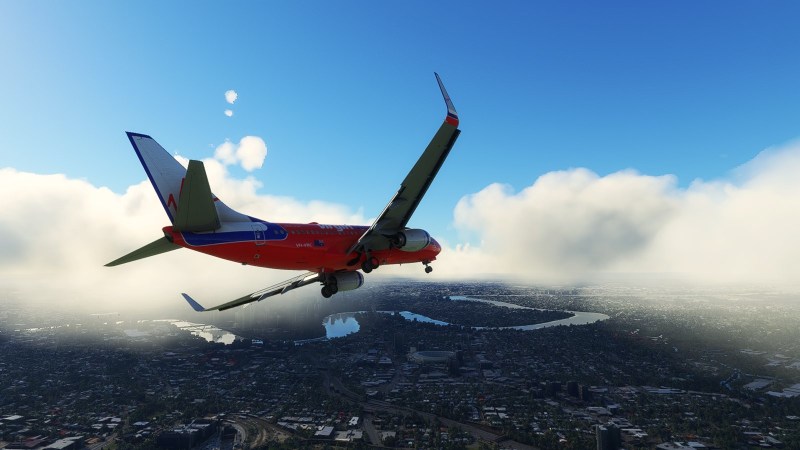
All the years of progress in the sim realm have lead up to these products getting to shine like never before.
Microsoft Flight Simulator has opened that coveted next step, the true tipping point where it no longer has to fake it to make it. The texture work, the flight dynamics, the lighting, the weather engine and thermal simulation, and simulation of various systems, they’re no longer constrained by primitive coding.
These add-on developers have always tipped the scale, but they could never fully push beyond what the sim they were developing allowed. And, since some elements of a given sim could only be enhanced with external products, it has always been a balancing act for the consumers to get all of their various add-on products to play nicely.
Now it’s all here in Microsoft Flight Simulator as one, complete package that the developers have full access to. Not to mention, PMDG has even worked closely with Asobo to ensure that the 737 could make full use of its feature-set. This is why it took longer than expected to release. There was so much more than PMDG thought it had to do to get it up and running since it wanted to provide a fully original rendition rather than a scaled-up re-release.
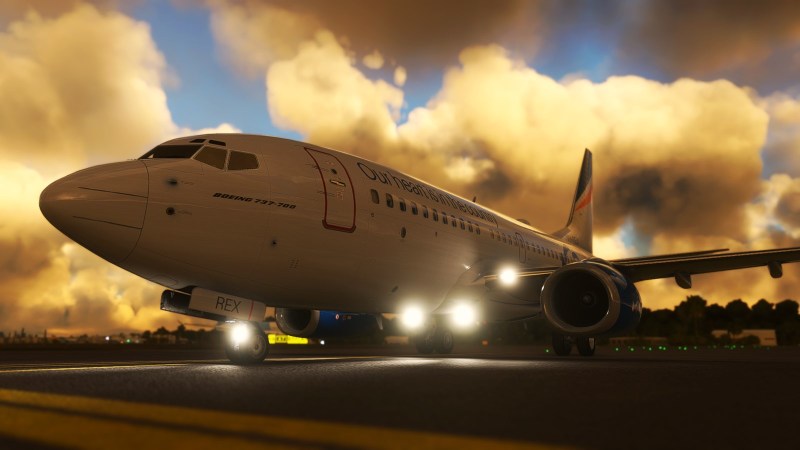
I almost hate to admit that I bought this out of FOMO, and yet I appreciate what all the fuss has been about.
At the end of it all…
And, here we are. Nearly a month later, and a few dozen flying hours under my own belt, what can I say about the PMDG 737? I like it. It’s a beautiful plane with a great soundset, cool features, and nicely detailed systems. I do enjoy the complexity of it, all while not being too overwhelmed due to the team thinking ahead and making it accessible to both newcomers and sim vets alike.
But, I probably never would’ve been swooned enough to jump into this had the sim itself not already offered so much. So, now more than ever, such add-ons have a chance to thrive like never before. I hate to admit, at least to my wallet, that I’ve spent more on add-on planes in just the last two months than in the last 19 or so years I’ve been a simmer. It feels worth it now; the flight dynamics, the scenery, they all match up to make these planes look and feel richly authentic. Is it perfect? Of course not, but it is immaculate.
As I write this, I’m enjoying a short Florida hop in the Milviz Cessna 310, another highly-detailed add-on plane that I picked up due to intense word of mouth. But again, I’m loving it. Sure, it’s just $20 USD less than the sim itself, but I’m appreciating its attention to detail.
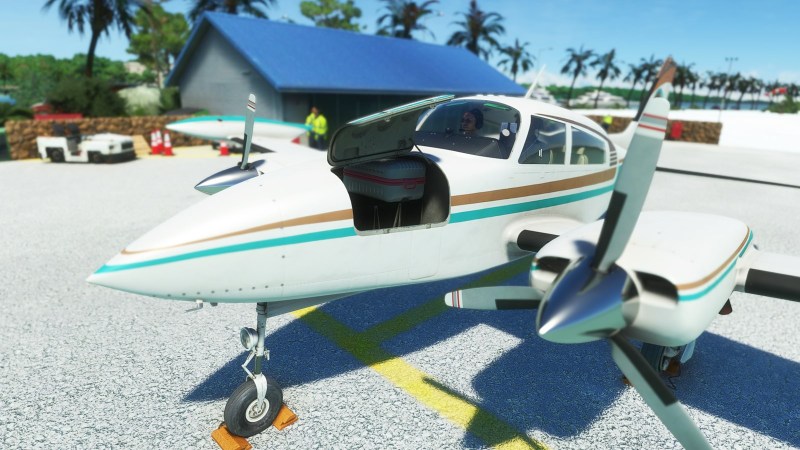
Those suitcases on the inside aren’t just fun props; it’s also a wonderful visualization of my money being locked and carried away from me.
I also have a Stream Deck waiting in my Amazon cart, not for game streaming, but to use to further enhance the immersion of my sim experience. Slowly but surely I’m sinking deeper into this hobbyist hole. And it’s all because, rather than the add-ons selling the sim like in the past, the sim itself makes a case for the add-ons. Woe to my wallet and better judgment, for the quest for the best is encompassing me — and it’s beautiful.

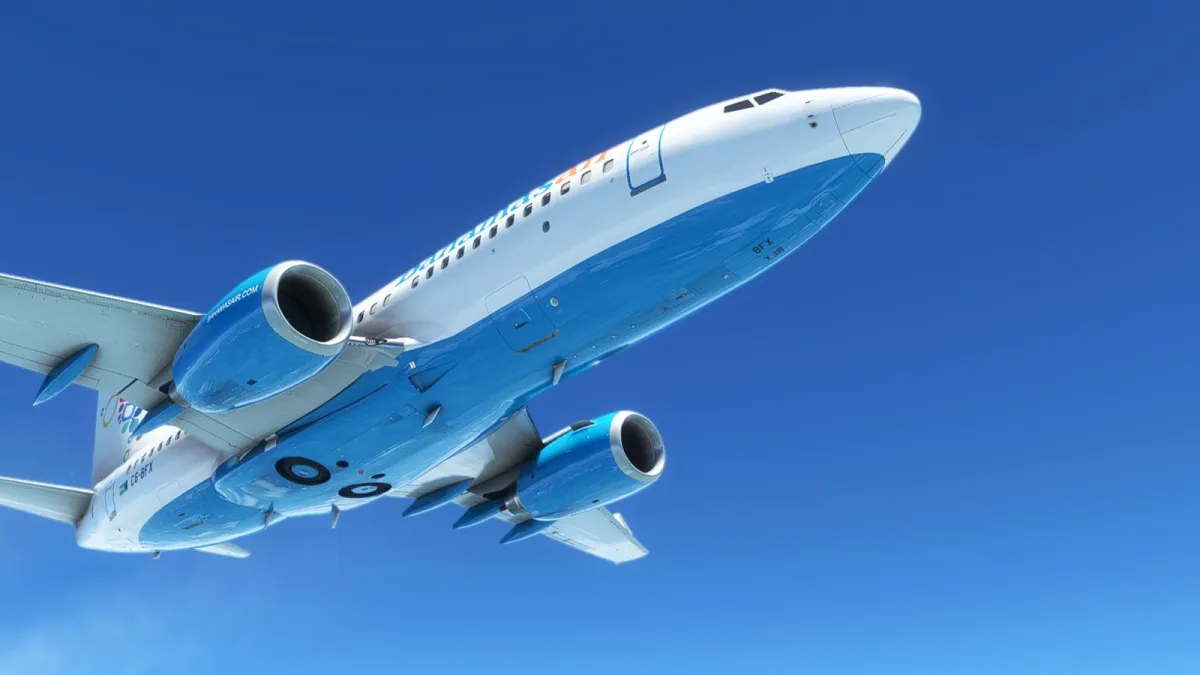
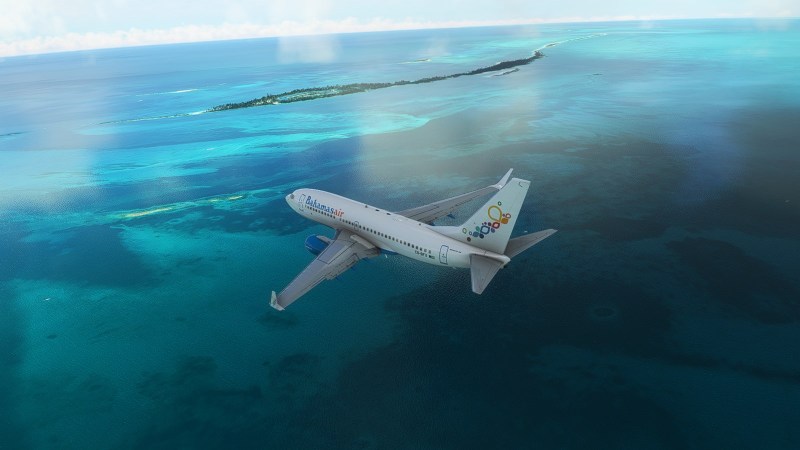
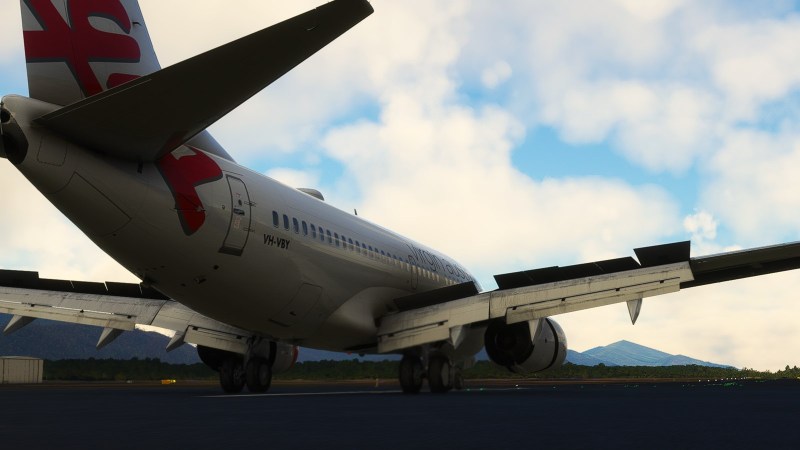






Published: May 31, 2022 04:00 pm